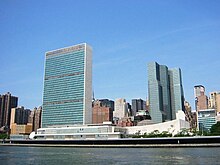United Nations
This is learning resouce about United Nations. The main purpose is to support a participatory way of capacity building.

Subtopics
edit- One United Nations[1]: United Nations is designed to support inter-sectorial and inter-governmental decision-making.
- United Nations Simulation:[2][3] Students learn about decision making as UN-embassadors or UN-delegates.
Learning Task
edit- First explore the structure of United Nations, why it was designed the way it is and how UN supports and promotes international co-operation and creates and maintains international order.
- What are the difference and the joint concepts of diplomacy comparing a national perspective of diplomacy with an international perspective from a body, programme or agency in United Nations (e.g. the World Health Organization (WHO) as a specialized agency of the United Nations)?
- Learn about United Nations Simulation, that gives students an opportunity to step into the role of a UN ambassador.
- Explore the Community of Practice in the Expert Focus Group for Space and Global Health. How can Wikiversity be helpful to co-create a Capacity Building material for global challenges.
- Explore the United Nations University and describe the scope and educational/scientific objectives.
See also
editReferences
edit- ↑ United Nations Delivering as One - official final report (accessed 2017/09/02) - Website: http://www.un.org/en/ga/deliveringasone/
- ↑ Model United Nations - programmes of United Nations Association of the United States of America - (assessed 2017/09/02) - http://unausa.org/global-classrooms-model-un/for-educators/resources/simulations
- ↑ Model United Nations - Germany - (accessed 2017/09/03) - http://www.model-un.de/en/studierende/
- ↑ UN Charter as Wiki Source (accessed 2017/09/02) - https://en.wikisource.org/wiki/Charter_of_the_United_Nations
- ↑ United Nations University - Official Website (accessed 2017/08/27) - https://unu.edu/